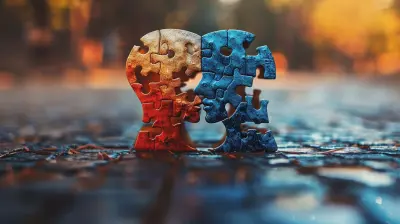Anxious Attachment: Understanding the Fear of Abandonment
4 September 2025
Have you ever felt like you're always walking on eggshells in relationships? Or maybe you've caught yourself overthinking a simple text from someone you care about? If you’ve experienced intense worry about someone leaving you—even without any signs they’re planning to—you may be dealing with something known as anxious attachment.
Don’t worry, you’re not alone. And no, you're not "too sensitive" or "clingy." These patterns usually go way back to childhood, and they can shape how we connect with others as adults. Let's get into what anxious attachment really is, why it happens, how it shows up in relationships, and most importantly—what you can actually do about it.
What Is Anxious Attachment?
Anxious attachment is one of the four main adult attachment styles in psychology (the others are secure, avoidant, and disorganized). People with this attachment style often feel a deep fear of abandonment. They crave closeness and intimacy but are also constantly worried their partner may leave them or doesn’t truly love them.It's like your heart wants to trust, but your mind keeps hitting the panic button.
This creates a constant push-pull dynamic. You want to be close to others—but at the same time, you're terrified of being too much and driving them away. It’s emotionally exhausting, to say the least.
Where Does Anxious Attachment Come From?
So, how does someone develop this attachment style?Well, it usually starts in childhood. Our early relationships with caregivers (think: parents, guardians, or whoever raised us) set the blueprint for how we view connection, love, and trust.
If your caregivers were inconsistent—affectionate one moment and distant the next—you might have developed anxious attachment. Basically, your brain learned: “Love is unpredictable. If I don’t stay hyper-aware and adjust myself constantly, I might lose it.”
Some specific childhood experiences that can lead to anxious attachment include:
- Emotional neglect (being ignored or dismissed)
- Inconsistent attention or affection
- Overly critical or controlling parenting
- Experiencing trauma or instability in the home
Over time, these early interactions teach you not to trust that love will stick around. So as an adult, you may cling harder to relationships or obsess over signs that someone’s about to leave.
Signs You Might Have Anxious Attachment
Wondering if this sounds like you? Let’s break down some common traits and behaviors of someone with an anxious attachment style:1. Constant Worry About Rejection
Even if your partner is kind and present, you might still feel like it's just a matter of time before they leave. You overanalyze their texts, tone, and even their breathing for clues.2. Needing Constant Reassurance
You need to hear "I love you" often—not because you're needy, but because your brain never feels fully safe or secure in the relationship.3. Fear of Being Alone
Solitude can feel unbearable. Even short periods without contact (like unanswered texts) can trigger anxiety, sadness, or panic.4. Difficulty Trusting
Ironically, even though you crave closeness, you may have trouble trusting your partner fully. There's always a little voice whispering, “What if they’re lying? What if they stop loving me?”5. Over-Investing in Relationships
You might throw yourself fully into a relationship too quickly, trying to prove your worth or keep the person close. It's like you’re offering 150% in the hopes they’ll give you just enough to feel okay.6. Sensitivity to Relationship Changes
Even minor shifts—like your partner being slightly quieter one day—can send you into an emotional tailspin.Sound familiar? These feelings are incredibly common, and again, they’re not your fault. What matters most is how you choose to move forward.
How Anxious Attachment Impacts Relationships
Anxious attachment doesn’t just affect how you feel—it also shapes how your relationships function.Here’s how:
Emotional Roller Coasters
Because you're constantly scanning for signs of abandonment, even small relationship issues can get blown out of proportion. One missed call can spiral into a full-blown panic that your partner doesn’t care.Codependency
People with anxious attachment often become emotionally entangled in their partner’s lives. Your sense of self-worth can become tied to how they feel about you, which can lead to unhealthy dependence.Pushing People Away
Ironically, the very behaviors meant to keep a partner close—constant texts, emotional outbursts, needing validation—can sometimes push them away. And that just reinforces the fear you had all along: that you'll be left.It’s a painful cycle, and it feels like you're stuck between needing more and fearing you’ll lose everything if you ask for it.
The Brain on Anxious Attachment
Let’s geek out for a second (don’t worry, I’ll keep it simple).When you're anxiously attached, your brain is basically in survival mode during social interactions. Your amygdala, the part responsible for detecting danger, is hypersensitive to signs that someone might abandon you. And your prefrontal cortex (the rational thinking part) often gets hijacked during stress.
So even if your partner is just having a bad day, your brain might read it as, “They’re going to leave me!” It’s like having a faulty smoke detector that blares every time you toast bread.
Understanding that this is your nervous system reacting—not you being “too much”—can be really healing.
Breaking the Cycle: How to Heal Anxious Attachment
The good news? You're not stuck with anxious attachment forever. Like any pattern, it can be unlearned and rewired—yes, even if it’s deeply ingrained.Here’s how to start making lasting changes:
1. Self-Awareness is Everything
Start by noticing your thought patterns. What triggers your fear of abandonment? How do you typically react? Journaling can be a great way to catch those thoughts in the act.2. Inner Child Work
A lot of anxious attachment stems from unmet needs in childhood. Inner child work involves connecting with your younger self, validating their feelings, and offering them the support they never had. It sounds woo-woo, but it's powerful stuff.3. Therapy Helps—A Lot
Working with a therapist, especially one trained in attachment theory or EMDR, can help you understand where your fears come from and how to shift your responses.4. Practice Secure Behaviors
You don’t have to wait to feel secure to act secure. Start practicing secure attachment behaviors, like:- Communicating feelings calmly
- Taking space when needed
- Trusting your partner’s intentions
- Setting boundaries (even with yourself!)
It might feel awkward at first, but over time, it becomes more natural.
5. Reframe Abandonment
Instead of seeing someone leaving as the end of the world, reframe it as redirection. If someone doesn't choose you, it might hurt—but it also makes room for someone who will. You’re not being abandoned; you’re being guided.How Partners Can Support Someone with Anxious Attachment
If you're on the other side of this dynamic—dating someone with anxious attachment—know that your support can make a world of difference. Here’s what helps:- Be consistent. Predictability builds trust.
- Offer reassurance. A simple “I love you” or “I’m not going anywhere” goes a long way.
- Stay calm during emotional moments. Don’t take everything personally.
- Encourage personal growth. Support their journey without trying to "fix" them.
Remember: they’re not trying to overwhelm you. They’re trying to feel safe.
The Road to Secure Attachment
While it may seem like a pipe dream right now, moving from anxious to secure attachment is totally possible. It’s not about becoming perfect—it’s about becoming more aware, more grounded, and more compassionate toward yourself.Over time, you’ll notice:
- Less fear around being alone
- More trust in relationships
- Calmer responses to conflict
- Less obsession over what others think
The journey isn’t linear, and you’ll have setbacks. But healing happens in small, messy, beautiful steps.
You deserve love that feels safe, secure, and mutual. And more importantly? You deserve to feel safe within yourself.
So next time your brain starts whispering, “They’ll leave you,” respond with something new: “Even if they do, I’ll be okay. I’ve got me.”
Final Thoughts
Anxious attachment doesn’t define you—it describes habits you learned to survive. It's a form of emotional armor, built during a time when you didn’t have better options. The fact that you're reading this means you're ready to shed it and step into something healthier.Healing takes time. But step by step, you can rewrite your relationship with love, connection, and most importantly… yourself.
all images in this post were generated using AI tools
Category:
Attachment TheoryAuthor:

Paulina Sanders
Discussion
rate this article
1 comments
Mara Hudson
This article offers valuable insights into anxious attachment and its roots in fear of abandonment. It expertly highlights how childhood experiences shape adult relationships, emphasizing the importance of self-awareness and communication. Understanding these dynamics can foster healthier connections and personal growth, making it a must-read for those interested in attachment theory.
October 1, 2025 at 3:58 PM

Paulina Sanders
Thank you for your thoughtful feedback! I'm glad you found the insights on anxious attachment and the impact of childhood experiences valuable. Self-awareness and communication are indeed key to fostering healthier relationships.


